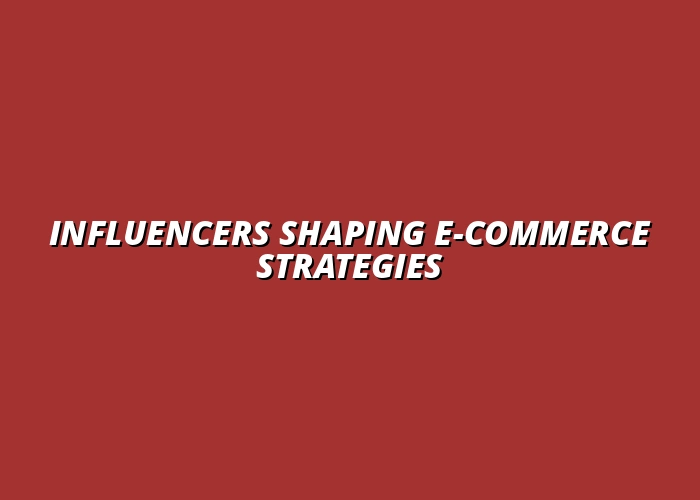Target Audience Alignment
Ensure the influencer’s audience aligns with your brand’s target demographic for better engagement and conversion.
Join The Cash Automator community and receive expert strategies to build automated online income streams directly in your inbox.
Posted on: 2025-08-15
By: Liam Corbin
In a world where consumer trust is dwindling, how can brands effectively connect with their audience? The answer lies in the power of influencers—individuals who can bridge the gap between brands and consumers, providing authenticity that traditional marketing often lacks. Harnessing this potential can transform your e-commerce strategy!
Explore the essential elements for effective influencer marketing and how they contribute to brand success. Understanding how to track e-commerce analytics simply is crucial for measuring the impact of your influencer campaigns and optimizing your overall strategy for better results.
Ensure the influencer’s audience aligns with your brand’s target demographic for better engagement and conversion.
Analyze the influencer’s style to ensure it reflects your brand’s messaging and values.
Look beyond follower counts; high engagement rates can indicate a more impactful influencer partnership.
Influencers foster trust and credibility, making their endorsements more valuable to potential customers.
In today’s digital age, influencer marketing has become a crucial component of successful e-commerce strategies. But what exactly is it? Influencer marketing involves partnering with individuals who have a significant following on social media or other platforms, allowing brands to tap into their audience to promote products and services. This method has evolved tremendously, driven by changes in consumer behavior and technology. With the rise of platforms like Instagram and TikTok, influencers are now at the forefront of brand communication, shaping the way we shop online.
As we dive deeper, it’s important to recognize the emerging trends in this space. For instance, the shift toward authenticity has transformed how brands collaborate with influencers. Consumers now favor genuine recommendations over traditional advertisements. Platform algorithms constantly adapt, making it essential for brands to stay ahead. By understanding these dynamics, we can better harness the power of influencer marketing for e-commerce success!
Influencer marketing plays a pivotal role in the e-commerce landscape by creating a bridge between brands and consumers. It’s not just about the size of an influencer’s audience; it’s about the connection they have with their followers. When influencers share their experiences with a product, they provide authenticity that traditional advertising often lacks. This connection can lead directly to increased sales and brand loyalty.
Here are some key aspects to consider when evaluating influencer marketing:
Trust is a cornerstone of successful e-commerce, and influencers play a significant role in fostering that trust. They act as relatable figures, bridging the gap between brands and potential customers. When an influencer shares a product they love, it sends a message of credibility that resonates with their audience. People are more likely to purchase from brands that their favorite influencers endorse!
Social proof is another essential aspect. When followers see others enjoying a product or service, they’re more inclined to consider it themselves. This cycle of visibility and engagement helps create a community around the brand, leading to increased loyalty and repeat purchases. By collaborating with the right influencers, brands can effectively enhance their credibility and trust among consumers. This approach can also be integrated into broader strategies like automating your e-commerce sales efficiently to maximize reach and conversion.
Brand ambassadors take influencer marketing a step further. They are typically long-term partners who embody a brand’s values and messaging. These ambassadors can enhance the overall influencer marketing effort by providing consistent, authentic content that strengthens brand identity. Their ongoing relationship with the brand allows for deeper storytelling and engagement.
Consider the following advantages of working with brand ambassadors:
At The Cash Automator, we see the value in combining influencer marketing with brand ambassadors to create a cohesive approach to e-commerce. This strategy not only boosts sales but also builds a loyal community around your brand!
When collaborating with influencers, consider utilizing micro-influencers. With smaller, but highly engaged audiences, they often yield higher engagement rates and lower costs. Their genuine connections with followers can lead to more authentic endorsements, making them a powerful asset in your influencer marketing strategy.
In the world of influencer marketing, authenticity is everything. However, as brands jump on board this trend, they also face challenges like influencer fraud. Common issues include fake followers and inflated engagement rates that can mislead brands. Understanding these risks is crucial for ensuring that your influencer partnerships are genuine and effective.
To mitigate these issues, it's essential to implement strategic vetting processes. Here are some steps you can take to safeguard your campaigns:
By staying vigilant and using these tactics, brands can create more meaningful partnerships with influencers and ensure their marketing efforts yield real results!
Long-term collaborations with influencers can enhance authenticity and foster deeper engagement. However, maintaining that authenticity over time requires effort. Brands should focus on building relationships rather than just transactional exchanges.
Here are some effective strategies to ensure ongoing authenticity:
These strategies not only strengthen the partnership but also resonate better with the audience, leading to more authentic and impactful marketing! For more ideas on how to foster engagement, consider exploring boosting e-commerce customer loyalty through various strategies.
While Instagram and TikTok are popular, new social platforms are emerging that can transform influencer marketing. Brands should keep an eye on these niche platforms to expand their reach and connect with different audiences.
Some platforms to consider include:
Using these platforms strategically can open new avenues for influencer collaboration and make your campaigns more effective.
Not all e-commerce sectors are the same, which means tailored strategies are essential for maximizing influencer impact. Whether you’re in fashion, technology, or wellness, each industry has unique characteristics that can inform your marketing efforts.
Here are some specific tactics for different sectors:
By aligning your influencer marketing strategies with industry nuances, you can drive more effective campaigns.
Video marketing is a game-changer in the influencer space. YouTube has become a powerhouse for e-commerce, allowing brands to harness the power of visual storytelling. From tutorials to behind-the-scenes content, videos can captivate audiences in ways that static images cannot.
Consider incorporating these video strategies into your influencer campaigns:
With the right video content, you can enhance your marketing strategy and boost your e-commerce growth!
In summary, influencer marketing is a powerful tool for e-commerce brands looking to enhance their visibility and engagement. By prioritizing authenticity, leveraging new platforms, and adopting industry-specific strategies, brands can create impactful influencer campaigns that drive sales and foster long-term relationships.
It's time for brands to embrace the potential of influencer marketing! By implementing these strategies and continuously monitoring your efforts, you'll not only strengthen your brand's presence but also connect with your target audience in a more meaningful way. Let’s dive into this exciting opportunity together and unlock the true potential of e-commerce!
Here is a quick recap of the important points discussed in the article:

 As we stand on the brink of a transformative era defined by automation, the landscape of income dyna
As we stand on the brink of a transformative era defined by automation, the landscape of income dyna
 Content marketing is more than just a buzzword; it's the backbone of successful affiliate marketing.
Content marketing is more than just a buzzword; it's the backbone of successful affiliate marketing.
 Did you know that nearly 70% of consumers rely on content from resource pages to make informed purch
Did you know that nearly 70% of consumers rely on content from resource pages to make informed purch